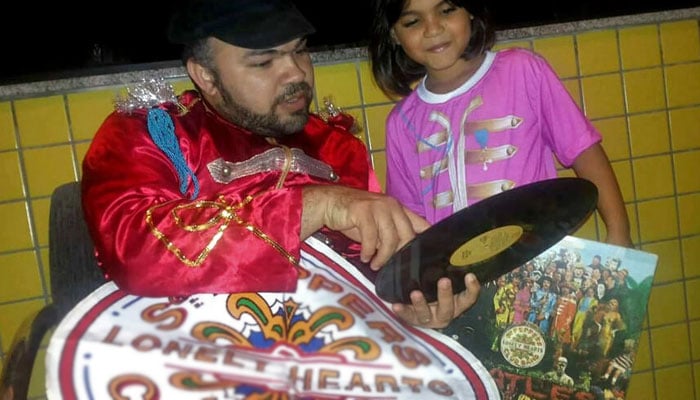But Schneider, who died that March at age 40, penned a letter to loved ones a year later, with a little help from his friends, the Beatles, and a viral video.

Like so many victims of COVID-19, Brazil's Carlo Schneider never got a chance to say goodbye to his family. Unlike most, he managed to get a message to them a year after he died.
Schneider's family, who describe him as a die-hard romantic with an infectious love of life, bid him farewell when the Brazilian hotel manager went to work one morning in February 2021, and never held him again.
Schneider came down that day with symptoms of the coronavirus, and stayed at the hotel to avoid infecting his family. His only contact after that was through his sick bed and a socially distant look – a terminally ill father in his car, his wife and three children shaking hands from home on their way to the hospital.
But Schneider, who died that March at age 40, penned a letter to loved ones a year later, with a little help from his friends, the Beatles, and a viral video.
The story begins at a dinner party in 2006, when Schneider, then expecting her first child, came up with the idea to write her and her friends a letter to open to their unborn daughter on her 15th birthday.
A passionate Beatles fan with hundreds of rare records, he hid the letters inside his most precious possession: his vinyl collection.
"He loved that sort of thing," says his wife, Alcione, who was six months pregnant at the time.
"He was always asking things like, If you could leave a message in a bottle for someone in the future, what would you say?"
He was the kind of father who did elaborate treasure hunts for his kids, the kind of friend who came over on your birthday at dawn to gift you a gift, she says.
Such escapes were so common at Schneiders' home in the northeastern city of Natal that they soon forgot all the letters, she says.
- Find those letters´ -
Fast forward 14 years, and the pandemic was wreaking havoc around the world. Like many people, Schneider lost his job.
Struggling financially, he decided to sell most of his record collection.
Things seemed to be getting better in early 2021, when he got a job at another hotel in Mosoro, 280 kilometers (175 mi) away.
But he soon caught Covid-19. It was the start of a brutal second wave with more than 3,000 people dying in a single day in Brazil.
It happened very fast, says Alcion, 41. The moving truck reached Mosoro on 12 February with its belongings. A week later, Schneider became ill. He was intubated on March 2. By March 11, he was gone.
Later, conjuring up memories in his mind, that he remembered those letters from long ago.
The impact hit gradually, she says. Barbara, their first child, will turn 15 in March, a week before the first anniversary of her father's death.
"Oh my god. I have to find those letters," she remembers thinking.
- untold goodbye -
After failing to find them in Schneider's remaining albums, she realized what had happened.
With her blessing, friends of Schneider posted a video on Beatle-maniac discussion forums asking that whoever bought the album return the letter.
The video soon went viral, prompting a flurry of stories in the Brazilian media.
Last September, a man called Alcion, saying he had bought some old records around that time. He hadn't opened them yet, he said. He himself had lost his son to Covid-19, and was battling depression.
But he promised that he would see when he saw it.
In December, the man called again, asking to meet him in Natal. There, he gave Schneider's copy of John Lennon's "Imagine", with three letters inside.
Barbara opened one from Schneider on her birthday last month, with Alcion by her side.
"He wrote that he was very much in love with my mother. He talked about the Beatles. He asked if Paul McCartney was still alive," Barbara says between laughter and tears.
At the end of the letter, Schneider's blue pen ran out of ink.
The message fades, then ends abruptly - reminding his family that the way he died, his lungs were weakened.
"It was surreal," Alcione says.
But "it was like, it was great to receive that letter," says Barbara, a chivalrous, precocious high-schooler.
"We never had to say goodbye. It gave me the opportunity to see him again."
